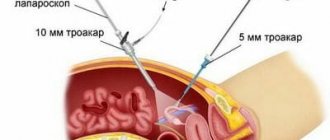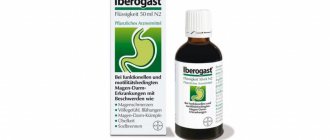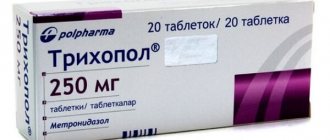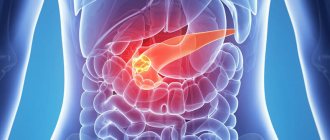What is natural is not ugly. For example, in some countries it is not customary to restrain certain natural things. Even though they smell unpleasant. In some ways, of course, these comrades are right. It is sometimes difficult to restrain yourself, but in general it is not good for your health. A person produces up to 12 liters of gaseous substances - in particular, methane or hydrogen sulfide - per day.
As long as this happens within acceptable limits, then you don’t have to think about how to fart unnoticed. You can hold back and run to the toilet. What if the gas turbine operates at excess power? Flatulence occurs! And sometimes you don’t have time to get to the toilet... And it’s unpleasant to listen to, and it smells bad, and you can’t help but feel ashamed. Maybe we need to fight the cause? Flatulence - how to solve this problem? What pills will help against flatulence?
Flatulence - why does gas formation increase?
Flatulence is a symptom of intestinal dysfunction
Flatulence is a disruption of the gastrointestinal tract, which is accompanied by increased gas formation. This phenomenon is not considered an independent disease, but only a symptom of certain pathologies in the gastrointestinal tract. Reasons for this problem:
- Excess starch and coarse fiber in the diet
- Lactose intolerance when drinking milk
- Swallowing air while eating
- Pathologies of the pancreas, which are accompanied by a decrease in the production of specific hormones
- A tumor that may be compressing part of the intestine. In this case, gases accumulate in the abdominal cavity
- Infectious diseases
- Diseases of the gastrointestinal tract and liver
- Worm infestation
- Pregnancy in women
- Neurological diseases
Causes of flatulence in toddlers:
- Imperfection of the digestive system
- Infections
- Food does not meet age standards
- Excess or deficiency, imbalance of food
- Swallowing air during feeding
Flatulence accompanies many unpleasant and complex diseases. Therefore, it is advisable to find out the cause of this condition, and then take action.
What is this substance?
Activated carbon - adsorbent
Activated carbon consists of small black granules or a solid black porous substance with a spongy shape.
Most often, this substance is used to make water filters and special medicines.
Activated charcoal as a medicine selectively removes toxins and cleanses the digestive tract. From a chemical point of view, activated carbon is carbon treated with oxygen.
Treatment with oxygen makes charcoal very porous. The tiny pores significantly increase the total surface area of the activated carbon, allowing liquids and gases to interact with the chemical compound.
Such chemical features determine the medicinal properties of activated carbon. Carbon adsorbs a wide range of impurities and contaminants, including chlorine, odors and pigments.
Other substances, such as sodium, fluorides and nitrates, do not react with coal. Since adsorption occurs by chemically binding impurities to carbon, the active sites in the charcoal eventually become filled with the substances.
Medicines for bloating
A large number of medications are used to treat this pathology:
- Drugs that normalize the microbiological composition of the intestines - Hilak Forte, Laktiale, Laktovit and so on
- Drugs that affect intestinal motility - Motilium, Cerucal
- Enzymes – Festal, Mezim, Imodium, Panzinorm
- Various enterosorbents - activated carbon, enterosgel and so on.
The doctor should select treatment after a thorough examination.
Lactiale - capsules for normalizing microflora
Activated carbon as a remedy for flatulence
If flatulence provokes intestinal dysbiosis, then complex treatment includes drugs to normalize the microflora. Laktiale capsules are available in 2 dosages - for adults and for children. The drug contains bifidobacteria, lactobacilli and enterococci, which make up the natural intestinal microflora.
The capsules contain living dried microorganisms. 60–120 minutes after administration, they begin to actively work in the stomach and intestines. Adult patients and adolescents over 12 years of age are prescribed 2 capsules 1 time per day after meals. The course of treatment is from 2 to 4 weeks. For children, there is a separate drug with a reduced content of microorganisms. Contraindications for use:
Contraindications
Activated charcoal for bloating is contraindicated in people with stomach and duodenal ulcers. Once in the digestive tract, it can affect diseased organs, causing deterioration and exacerbation of the disease.
The drug is strictly prohibited in the presence of bleeding from the digestive tract. Once in the blood, charcoal causes embolism of blood vessels, which leads to thrombotic formation. There is an unpleasant chance of a blood clot breaking off.
If the cause of bloating is intoxication caused by stagnation of feces in the intestines, it is not recommended to take activated charcoal. In this case, taking the sorbent is possible only after a cleansing enema. Otherwise, the medication will cause a major blockage of the intestinal ducts. It can lead to obstruction, which is removed surgically.
Motilium - don't let yourself fly away
This drug is available in tablet form and also as a suspension. In appearance, these are white or cream-colored tablets that have an antiemetic effect. What does flatulence have to do with it? The main active ingredient, domperidone, helps to contract the intestinal walls. This allows you to quickly evacuate leftover food from the body. Accordingly, gases are released naturally without being retained. The dosage of the drug depends on the patient’s age:
- Children under 12 years old – 1 tablet 3 times a day
- Adults and adolescents over 12 years old – 2 tablets 3 times a day
Indications for the use of Motilium:
- Feeling of fullness in the stomach
- Bloating and epigastric pain
- Flatulence
- Nausea, vomiting
- Acid reflux
The drug is not prescribed:
- Prolactinoma is a neoplasm in the pituitary gland
- Combined use with ketoconazole, erythromycin, fluconazole, clarithromycin
- Bleeding in any part of the gastrointestinal tract
- Perforation in any part of the gastrointestinal tract
- Drug intolerance
- Patient weight up to 35 kg
Analogs
There are many analogues of activated carbon. Sorbents are divided into organic and mineral. A distinctive feature of the drugs is the origin of the active substances: plant or synthetic.
Organic sorbents are made from plants. Most often, the active substance is lignin. It is present in all plants, most of which is found in coniferous trees. Medicines based on lignin:
- Polyphepan - used for gastrointestinal diseases, food poisoning. The medicine has a detoxifying effect, removes harmful substances and toxins from the body. Take one hour before meals. Dissolve the required amount in water. There is 1 gram of powder per 1 kilogram of human weight.
- Filtrum-sti - prescribed for intestinal infections caused by bacteria. Quickly removes toxins if the cause of their occurrence is poisoning with poisons, medications, or alcohol.
- Polyfan - used for viral hepatitis, dysbacteriosis, colitis, diarrhea, dysentery. Used in the treatment of dental diseases and bloating caused by gynecological pathologies. The sorbent is contraindicated for gastritis, constipation, and diabetes. Reduces the effectiveness of medications taken in parallel.
Mineral sorbents contain silicon dioxide. The drugs have an absorbent effect and remove harmful substances from the body. Effective against alkaloid poisoning. Medicines in this category include:
- Enterosgel – neutralizes poisons and toxins. Removes excess cholesterol and bilirubin from the body. Relieves intoxication in patients with viral hepatitis, with impaired renal function. It is taken as a prevention of allergic diseases. Enterosgel is contraindicated in case of intestinal obstruction and intolerance to individual components of the drug.
- Polysorb – copes with all known toxins. Interacts with all medications without reducing their effectiveness. The scope of the drug is wide: flu, allergies, poisoning, colds.
- Atoxil - the active ingredient of the drug adsorbs toxins and removes them from the body. It is used for acute diseases of the digestive tract, poisoning, hepatitis A and B, and burns. Not recommended for use during pregnancy. Side effects include: constipation, allergic reactions.
Festal is a combination drug
Flatulence tablets: Pancretin
Festal belongs to the combined enzyme medicines. In appearance it is a white dragee. The main active ingredients are the enzyme pancreatin and bovine bile. Indications for the drug:
- Chronic pancreatitis
- Cystic fibrosis
- Inflammatory processes in the gastrointestinal tract
- Complex therapy after surgery, radiation therapy
- Excessive gas formation
Contraindications to the administration of Festal tablets:
- Pancreatitis in the acute stage
- Liver failure
- Viral and obstructive jaundice
- Gallbladder diseases – stones, empyema
- Intestinal obstruction
The dosage of the drug depends on the age of the patient:
- Adults – from 1 to 2 tablets 3 times a day;
- Children - the doctor selects the dosage according to age and weight
Festal has few side effects, but you also need to pay attention to them:
- Dyspeptic symptoms – nausea, vomiting, defecation disorders
- Increased blood urea levels
- Irritation of the mucous membranes of the gastrointestinal tract, perianal area
- Individual allergic reactions
Although the drug “Festal” contains natural ingredients, it should not be used without a doctor’s prescription.
Side effects
What to do if your stomach is swollen and hurts?
Taking activated carbon may be accompanied by the development of side effects. These may be:
- attacks of nausea;
- constipation;
- skin rash;
- feeling of heaviness in the chest;
- dysbiosis
If side effects occur, you must stop taking the drug and consult your doctor.
Unpleasant sensations develop extremely rarely while taking the drug.
Panzinorm is another enzyme preparation
A complete analogue of “Mezim” and “Festal”. Available in the form of opaque capsules. Indications for taking Panzinorm:
- Improving the secretory function of the pancreas
- To improve digestion in patients with a healthy gastrointestinal tract
Drug dosage:
- Adults – 1 capsule 3 times a day with meals. According to indications, the dosage is increased to 15 pcs. in a day.
- Children over 3 years old – 1 capsule with meals.
Treatment with this drug is long-term and can take up to 6 months. The drug is not used for:
- Acute pancreatitis
- Children under 3 years old
- Children with cystic fibrosis under 15 years of age
- Component intolerance
- Pregnancy - as prescribed by a doctor











